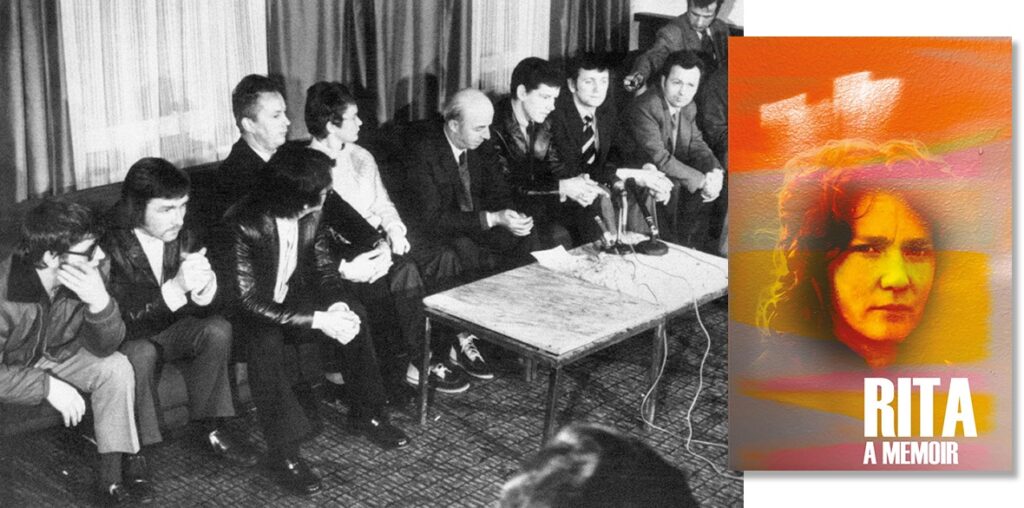The recently published book—Rita—A Memoir—was reviewed in the Morning Star, the left-wing British daily newspaper which focuses on social, political and trade union issues. The reviewer is Richard Rudkin who served with the British Army in the North in the 1970s:
AS a former British soldier who was in the North of Ireland in the early 1970s, I have read many accounts from those involved in the Troubles, including former military personnel. Every now and again, a book emerges that stands out from the rest. Rita — A Memoir is one such book.
The life of Rita O’Hare was a remarkable one. Born in 1943 to a Catholic mother and a Protestant father who joined the Communist Party in his teens, Rita grew up in the middle-class area of Andersonstown, West Belfast.
Married at just 17 and becoming a mother soon after, Rita tells us of her extraordinary life that took her on a journey from working in a bakery in Belfast, being forced into political exile, playing a key role in the peace-process which led to the Good Friday agreement, and her time working in Washington where she was on first name terms with American presidents, politicians and movie stars, and the no small matter of meeting Nelson Mandela.
Drawn into the Troubles by the injustice she witnessed all around her, despite being a mother, Rita talks about how she had to make a stand against injustice and denial of basic human rights to Catholics.
However, in 1970, to quote Rita’s own words, she reached a “now or never” moment. Having witnessed the brutality the British army inflicted on members of her community, along with the destruction and theft of property during the search of their homes, Rita reached the conclusion that peaceful protest was not going to achieve anything and chose to make a stand and joined the IRA.
Rita experienced her first spell in prison in 1971. Her crime was attending a peaceful protest at a court dressed in a combat jacket in support of several young men who were charged with wearing the same item of clothing and carrying a hurling stick, which carried an automatic six-month prison sentence. In the same year, Rita was almost killed after being shot three times by the British Army, sustaining serious injuries.

Shortly after Rita fled south she attended a press conference on 24 January 1972 addressed by the seven IRA Volunteers who had just escaped from the prison ship, The Maidstone. Pictured, (left-to-right) Tommy Toland, Thomas ‘Tucker’ Kane, Tommy Gorman, IRA Chief of Staff Sean McStiofain, Rita, Joe Cahill, Martin Taylor, Peter Rodgers, Sean Convery, and Jim Bryson: PA archive
On every page Rita’s voice comes through as an intelligent principled woman, who made her decisions in the firm belief that everything she did and every sacrifice she made (and there were many) wasn’t for herself, but to make Ireland better and a more equal place for those who followed her. I also sensed the sadness of how her commitment to that cause impacted on her family, especially when her arrest in 1971, for her alleged involvement with the attempted murder of a British army warrant officer, resulted in Rita skipping bail and crossing the border to the Republic of Ireland with her family, knowing a return to the UK would result in her immediate arrest.
Rita remained true to her political beliefs and principles whether it was enduring the harshness of the prison system, editing of the republican paper An Phoblacht (The Republic), being Sinn Féin’s director of publicity, or her role as Sinn Féin representative in Washington, a post Rita held for almost 20 years.
It would be hard for Rita O’Hare to detail all she had achieved in her life in the 177 pages that makes up this book, and I have no doubt that if Rita had not lost her battle with cancer in March 2023 while in the process of writing, there would be so much more. And so, the almost impossible task of completing the memoir fell on the shoulders of her friend, the former republican prisoner and acclaimed writer Danny Morrison, to complete the book. A challenging task which he has achieved by making it impossible to distinguish Rita’s voice from his own.
This book is more than just a memoir. It is an important record of how one ordinary woman said: “No. Enough is enough,” and despite almost losing her life and risking her freedom, continued to fight, work, and campaign for an Ireland that was inclusive for everyone.


